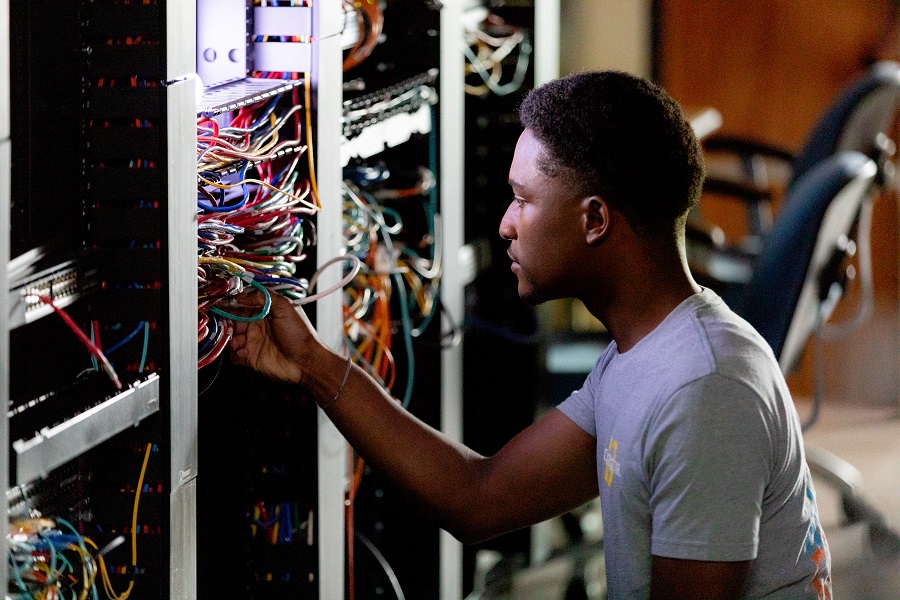
Meeting the Moment: Student Scholarships for COVID-19 Relief
Blog Post
We recently heard from a community college student who told us he had started to amass credit card debt to pay for rideshares to campus, having lost jobs and his income to the pandemic. Another thrown into unemployment finally found a new job but is working till 1 a.m.—just hours before class starts—leaving little time to study. A third student is successfully juggling six kids, two jobs, English as a second language courses, and his college program, but that fragile balance is disrupted because two-thirds of his income vanished.
These students believe community college can help them secure a better future. But the reality of a huge economic burden from COVID-19 sometimes means choosing between food on the table today or a brighter future.
The economic and health impacts of the COVID-19 pandemic are disproportionally devastating for students of color and low-income students—those most likely to begin their path to a career, and economic mobility, in a community college. Yet enrollment in community colleges is down 9.5 percent from fall 2019 to fall 2020, a decline far greater than in any other sector of higher education, according to the National Student Clearinghouse. The decrease is even higher for Black, Hispanic, and Native American students.
In response to these challenges, the Aspen Institute College Excellence Program and the Siemens Foundation are providing scholarships for financial relief from the pandemic.
Committed to helping students succeed in training and education despite these obstacles, together, we’ve granted $75,000 to students for COVID-19 financial relief—scholarships of around $4,000 to $4,500 to 16 students in strong community college STEM programs across the country.
The eight programs these students are enrolled in each won the 2020-21 Excellence and Equity in Community College STEM Award, a joint Aspen-Siemens Foundation initiative. These programs lead the way in launching diverse students into strong STEM careers. The information technology program at Green River College in Washington, for example, partners with local Muckleshoot Tribal College to advance opportunity for Native American students. In Houston, San Jacinto College opened a new nursing program at a campus in a low-income neighborhood with the college’s highest concentration of students of color.
The students receiving these scholarships were chosen because they needed the financial boost in light of the COVID-19 pandemic, but also because they are tenacious and committed to completing their credentials no matter what. We hope that this support will help them on their path to careers in STEM—and a bright future.
For Aspen and the Siemens Foundation, the scholarships reflect a commitment to help community colleges advance equitable student success in the face of unprecedented challenges. Additionally, for the Siemens Foundation, this is a part of a larger effort to address the pandemic and forge a path to economic recovery. Last month, the Siemens Foundation committed $2 million to two Community Development Financial Institutions Funds (CDFIs) to promote economic revitalization and racial equity in the real estate and health care sectors. In 2020, the Siemens Foundation, including funding from the Siemens Healthineers Fund, donated $2 million to 20 community health centers across the country, enabling the continuity of care for millions of Americans in underserved and uninsured communities. Other Siemens Foundation donations are supporting HBCUs in their plans to safely reopen campuses and efforts by the National Governors Association to retrain workers in the new economy.
STEM careers offer people a pathway to economic security, but the impacts of COVID-19 are forcing too many students, particularly students of color, to choose between their education and their bills. Access to these jobs is more important than ever for workers, our economy, and our communities. These professionals are forging the way in technology innovations and fighting on the frontlines of the pandemic. We need these talented students to succeed in their training for these careers, and Aspen and the Siemens Foundation are proud to support them.
Joshua Wyner is the executive director of the College Excellence Program and a vice president at the Aspen Institute. David Etzwiler is CEO of the Siemens Foundation.
